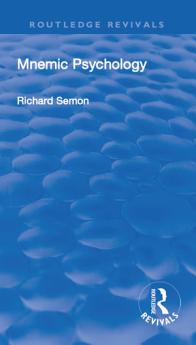Revival: Mnemic Psychology (1923)
Mayelana nale ebook
Mayelana nomlobi
Richard Wolfgang Semon (22 August 1859, Berlin – 27 December 1918, Munich) was a German zoologist and evolutionary biologist, a memory researcher who believed in the inheritance of acquired characters and applied this to social evolution.
Semon proposed psycho-physiological parallelism according to which every psychological state corresponds to alterations in the nerves. His ideas of the mneme (based on the Greek goddess, Mneme, the muse of memory) were developed early in the 20th century. The mneme represented the memory of an external-to-internal experience. The resulting "mnemic trace" (or "engram") would be revived when an element resembling a component of the original complex of stimuli was encountered. Semon’s mnemic principle was based upon how stimuli produce a "permanent record,... written or engraved on the irritable substance," i.e. upon cellular material energistically predisposed to such inscription (Semon 1921, p. 24).
According to historian Petteri Pietikainen:
Semon argued not only that information is encoded into memory and that there are 'memory traces' (engrams) or after-effects of stimulation that conserve the changes in the nervous system, he also contended that these changes in the brain (that is, engrams) are inherited. Semon's mneme-theory fell into disrepute largely because in a Lamarckian fashion it proposed that memory units are passed from one generation to another.
Semon was a proponent of the theory of organic memory, which was popular amongst biologists and psychologists from 1870 to 1918. The theory later lost scientific legitimacy as it yielded no reliable data and advances in genetics made the theory untenable.
Translated from German by Bella Duffy
Introduction written by Vernon Lee







